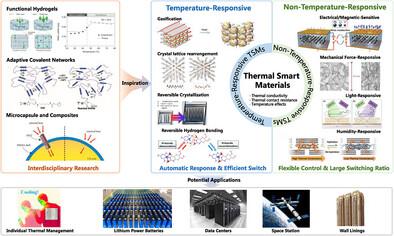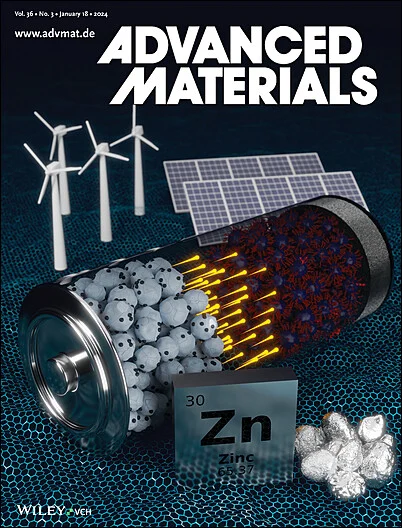Developments and Opportunities in Temperature‐Responsive Thermal Smart Materials
IF 26.8
1区 材料科学
Q1 CHEMISTRY, MULTIDISCIPLINARY
引用次数: 0
Abstract
Controllable thermal management is essential in environmental‐sensitive application scenarios, such as lithium batteries, data centers, and human body systems. This necessity has spurred the development of next‐generation intelligent materials. Thermal smart materials (TSMs), which can self‐adjust their thermal conductivity (TC) in a specific temperature range in response to external stimuli, have attracted significant interest due to their advantages over traditional temperature control systems or devices, including convenience, efficiency, and compact structure. Here, an overview of the non‐temperature‐responsive TSMs stimulated is first presented by various factors such as electrical/magnetic, light, mechanical force, humidity, and temperature, followed by a focused summary of the key mechanisms underlying temperature‐responsive TSMs that have thermal sensitivity. By addressing existing gaps and opportunities in the field of TSMs, we outlook future directions of thermoresponsive TSMs from three aspects: crystal state transition, reconfigurable chemical structures, and temperature‐based multi‐mechanism coupling. Finally, the potential applications of TSMs in data centers, electronic components, and individual thermal management are discussed. Based on the existing research on TSMs and the advances in related fields, we hope this perspective will guide the future development of high‐performance TSMs.

温度响应热智能材料的发展与机遇
可控热管理在锂电池、数据中心和人体系统等环境敏感型应用场景中至关重要。这种需求刺激了下一代智能材料的发展。热智能材料(TSMs)可以响应外部刺激在特定温度范围内自我调节其热导率(TC),由于其优于传统温度控制系统或设备的优点,包括便利性,效率和紧凑的结构,引起了人们的极大兴趣。本文首先概述了受电/磁、光、机械力、湿度和温度等各种因素刺激的非温度响应型tsm,然后重点总结了具有热敏性的温度响应型tsm的关键机制。通过分析热响应型tsm领域存在的空白和机遇,我们从晶体状态转变、化学结构可重构和基于温度的多机制耦合三个方面展望了热响应型tsm的未来发展方向。最后,讨论了tsm在数据中心、电子元件和个人热管理方面的潜在应用。基于对tsm的现有研究和相关领域的进展,我们希望这一观点能够指导高性能tsm的未来发展。
本文章由计算机程序翻译,如有差异,请以英文原文为准。
求助全文
约1分钟内获得全文
求助全文
来源期刊

Advanced Materials
工程技术-材料科学:综合
CiteScore
43.00
自引率
4.10%
发文量
2182
审稿时长
2 months
期刊介绍:
Advanced Materials, one of the world's most prestigious journals and the foundation of the Advanced portfolio, is the home of choice for best-in-class materials science for more than 30 years. Following this fast-growing and interdisciplinary field, we are considering and publishing the most important discoveries on any and all materials from materials scientists, chemists, physicists, engineers as well as health and life scientists and bringing you the latest results and trends in modern materials-related research every week.
 求助内容:
求助内容: 应助结果提醒方式:
应助结果提醒方式:


